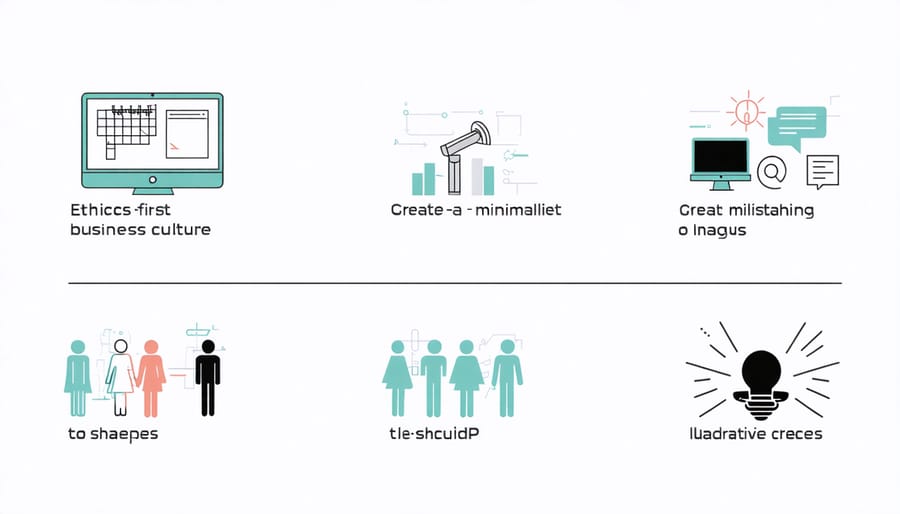
Transform your business through virtue ethics by prioritizing character-driven leadership over profit-driven decisions. In today’s competitive marketplace, companies implementing ethical business practices consistently outperform their peers, building lasting customer loyalty and employee satisfaction.
Consider how The Body Shop revolutionized the beauty industry by championing cruelty-free testing and fair trade sourcing, demonstrating how courage and compassion can create sustainable business success. Their commitment to environmental stewardship and community support hasn’t just earned customer trust—it’s redefined industry standards and inspired countless others to follow suit.
Modern virtue ethics in business isn’t about choosing between profitability and principles. Companies like Patagonia prove that practicing wisdom in resource management, justice in supply chain relationships, and temperance in growth strategies creates resilient organizations that thrive through changing market conditions.
Whether you’re a small business owner or corporate leader, incorporating virtue ethics means asking not just “Is this legal?” but “Is this right?” This approach transforms daily decisions into opportunities for building a business that reflects your deepest values while inspiring others to do the same. When integrity guides your business strategy, success naturally follows.
How Beauty Brands Build Character-Based Leadership

The Body Shop’s Courage in Animal Testing Stance
When The Body Shop first opened its doors in 1976, founder Anita Roddick made a bold decision that would shape not just the company’s future, but the entire beauty industry. At a time when animal testing was standard practice, she took an unwavering stance against it – a choice that perfectly exemplifies virtue ethics in action.
The company’s commitment wasn’t just about following rules or maximizing profits; it was about doing what was fundamentally right. This ethical stance came with significant business risks, especially in the early years when cruelty-free products were far from mainstream. The Body Shop had to work harder to develop alternative testing methods and build relationships with suppliers who shared their values.
What makes this example particularly powerful is how The Body Shop turned their ethical stance into a movement. They became the first global beauty brand to campaign against animal testing in cosmetics, collecting millions of signatures and successfully lobbying for legislative changes. This courage to stand firm on their principles, even when it meant swimming against the current, helped transform industry standards.
Today, The Body Shop’s early stance looks prescient – cruelty-free beauty has become a consumer expectation rather than an exception. Their story shows how virtue-based decision-making, focused on character and moral courage rather than just consequences, can create lasting positive change while building a successful business.
Transparency in Ingredient Sourcing
In today’s beauty industry, transparency isn’t just a buzzword – it’s becoming a cornerstone of ethical business practices. Take Lush Cosmetics, for example, who’s made waves by displaying photos of their ingredient suppliers right on their product packaging. This personal touch helps customers connect with the entire supply chain journey, from farm to bathroom shelf.
The Body Shop has similarly embraced virtue ethics by implementing their Community Trade program, which ensures fair wages and sustainable practices while being completely open about where they source their shea butter, tea tree oil, and other key ingredients. This commitment to transparency has not only improved their environmental impact in beauty but has also built incredible trust with their customer base.
Smaller indie brands are following suit, with companies like Beautycounter publishing their “Never List” of banned ingredients and providing detailed sourcing maps for their raw materials. They regularly invite customers to virtual tours of their partner farms and processing facilities, creating an unprecedented level of openness in the industry.
This shift towards radical transparency isn’t just good ethics – it’s good business. Studies show that 73% of consumers are willing to pay more for products with clear ingredient sourcing information, proving that virtue and profitability can go hand in hand.
Restaurant Industry’s Path to Virtuous Leadership
Sustainable Sourcing Practices
Last week, I visited a charming farm-to-table restaurant that completely changed my perspective on sustainable business practices. The owner, Sarah, shared how she’s built relationships with local farmers who use regenerative agriculture methods, ensuring her restaurant’s ingredients are both environmentally responsible and delicious.
This approach to sustainable sourcing isn’t just about feeling good – it’s about doing good while running a successful business. More restaurants are embracing this ethical framework by carefully selecting suppliers who share their values. For instance, some establishments have started working directly with fisheries that practice responsible harvesting, while others partner with urban farms to reduce transportation emissions.
The beauty of sustainable sourcing lies in its ripple effect. When restaurants prioritize local, seasonal ingredients, they naturally create menus that celebrate regional specialties while supporting their community’s economy. I’ve noticed how these choices inspire customers too – many diners now specifically seek out restaurants that demonstrate environmental consciousness.
Some practical examples include maintaining kitchen gardens for herbs and microgreens, implementing composting programs, and creating seasonal menus that adapt to local availability. These choices might seem small, but they add up to make a significant impact. Plus, they often result in fresher, more flavorful dishes – proving that doing the right thing can also be good for business.

Fair Treatment of Staff and Suppliers
I recently witnessed a small beauty brand transform their business relationships by prioritizing fair treatment, and it beautifully illustrates how virtue ethics can create positive ripple effects throughout an organization. The owner made it a point to pay her suppliers within 10 days instead of the standard 30, understanding that many were small, women-owned businesses that relied on steady cash flow.
This commitment to fairness extends to staff treatment too. Take the case of Sweet Delights Bakery, where owner Sarah Martinez implemented a profit-sharing program for all full-time employees. She also ensures that her team has flexible scheduling options to accommodate family commitments and personal needs – something that deeply resonates with her predominantly female workforce.
Beyond just fair compensation, ethical treatment includes giving voice to both staff and suppliers. Regular feedback sessions, open-door policies, and collaborative decision-making create an environment where everyone feels valued. I’ve seen businesses thrive when they establish mentor programs for junior staff and create clear advancement pathways based on merit rather than favoritism.
Remember, treating people fairly isn’t just about following rules – it’s about genuinely caring for their wellbeing and success. When businesses prioritize ethical treatment, they often see increased loyalty, better product quality, and stronger long-term relationships. It’s a beautiful example of how doing good and doing well can go hand in hand.
Implementing Virtue Ethics in Your Business

Building an Ethics-First Culture
Creating an ethics-first culture starts with leading by example. I remember working with a small beauty brand owner who transformed her company culture by making ethical decisions a daily practice, not just a policy on paper. She began each morning meeting by sharing a positive customer story that highlighted integrity in action.
To build your own ethics-first environment, start by clearly communicating your company’s values. Make them visible, discuss them often, and most importantly, demonstrate them in your actions. Create opportunities for team members to practice ethical decision-making through role-playing exercises and regular discussions about real workplace scenarios.
Recognition plays a crucial role too. When you notice team members making choices that align with your ethical values – like being honest with customers about product limitations or going the extra mile to resolve a service issue – celebrate these moments publicly. This reinforces the behavior you want to see.
Consider implementing a mentorship program where experienced team members can guide newer ones in navigating ethical challenges. Regular ethics workshops and training sessions keep these principles fresh and relevant, while anonymous feedback channels ensure everyone feels safe sharing concerns or suggestions for improvement.
Remember, building an ethical culture is a journey, not a destination. It requires consistent effort, open communication, and a genuine commitment to doing what’s right, even when it’s not the easiest path.
Measuring Ethical Impact
Let me share something I learned while working with small business owners: measuring ethical impact isn’t just about counting numbers – it’s about understanding the ripple effects of our choices. Start by creating an “ethics scorecard” that tracks key indicators like employee satisfaction, customer feedback, and community engagement. For example, if you run a beauty salon, you might monitor the percentage of eco-friendly products used, employee retention rates, and positive customer reviews mentioning your values-based practices.
Regular team surveys can reveal how well your ethical principles are understood and practiced. Ask questions like “How comfortable do you feel speaking up about ethical concerns?” or “Do you see our company values reflected in daily operations?” These insights are gold!
Consider implementing a quarterly ethics review where you assess decisions made and their outcomes. Did choosing a slightly more expensive but fair-trade supplier actually lead to better product quality and customer satisfaction? Document these findings and share them with your team.
Remember, improvement comes through honest reflection. Create anonymous feedback channels for employees and customers to share their perspectives on your ethical practices. This open dialogue helps identify blind spots and areas for growth while building trust with all stakeholders.
Small Business Success Through Virtue
Let’s explore some heartwarming examples of small businesses that have flourished by putting virtue at the heart of their operations. I’ve had the pleasure of meeting several entrepreneurs who prove that ethical practices and small business success strategies go hand in hand.
Take Sarah’s local bakery, “Sweet & Simple,” which has become a neighborhood favorite not just for its delicious pastries, but for its unwavering commitment to integrity. Sarah sources all her ingredients from local farmers, paying fair prices even when larger suppliers offer cheaper alternatives. She’s created a workplace where her staff receives living wages and flexible schedules, acknowledging their roles as parents and students. The result? Extremely low turnover and a team that treats customers like family.
Another inspiring example is Maria’s eco-friendly beauty salon, “Pure Glow.” When she started her business, she made the bold choice to use only cruelty-free, environmentally conscious products, despite their higher cost. She also implemented a mentorship program for aspiring beauticians from underprivileged backgrounds. While these decisions initially stretched her budget thin, her authentic commitment to these values has earned her a fiercely loyal client base who share her principles.
The “Green Groove Café” demonstrates how courage in business ethics can pay off. Owner James faced criticism when he decided to eliminate single-use plastics and source only organic ingredients, which meant higher prices. Instead of backing down, he transparently shared his reasoning with customers and invited them to be part of the journey. Today, his café is celebrated as a community leader in sustainable business practices.
These businesses share common threads: they prioritize long-term relationships over short-term profits, maintain transparency with stakeholders, and actively contribute to their communities’ wellbeing. Their success isn’t measured solely in profit margins but in the positive impact they create. They prove that when virtue guides business decisions, both the bottom line and the community can thrive together.
Remember, building a virtuous business doesn’t mean sacrificing success – it often becomes the very foundation of it. These entrepreneurs show us that staying true to our values isn’t just good ethics; it’s good business.
As we’ve explored through these real-world examples, implementing virtue ethics in business isn’t just about following rules – it’s about fostering a culture of genuine goodness and integrity. When companies prioritize virtues like honesty, compassion, and fairness, they don’t just build stronger relationships with their customers; they create workplaces where employees feel valued and motivated to do their best work.
I’ve seen firsthand how businesses that embrace these principles tend to thrive in the long run. They enjoy stronger customer loyalty, better employee retention, and a more positive reputation in their communities. Remember, ethical business practices aren’t just nice-to-have additions – they’re essential ingredients for sustainable success in today’s conscious marketplace.
Starting small is perfectly fine. Perhaps you could begin by implementing transparent pricing policies, establishing fair treatment guidelines for all employees, or creating environmentally responsible practices in your daily operations. The key is to make these virtues an integral part of your business DNA rather than treating them as optional extras.
Let’s all do our part in creating a business world where virtue ethics aren’t the exception but the norm. After all, when we lead with values, profits often follow naturally – and more importantly, we can feel proud of the positive impact we’re making in our communities and the world at large.



